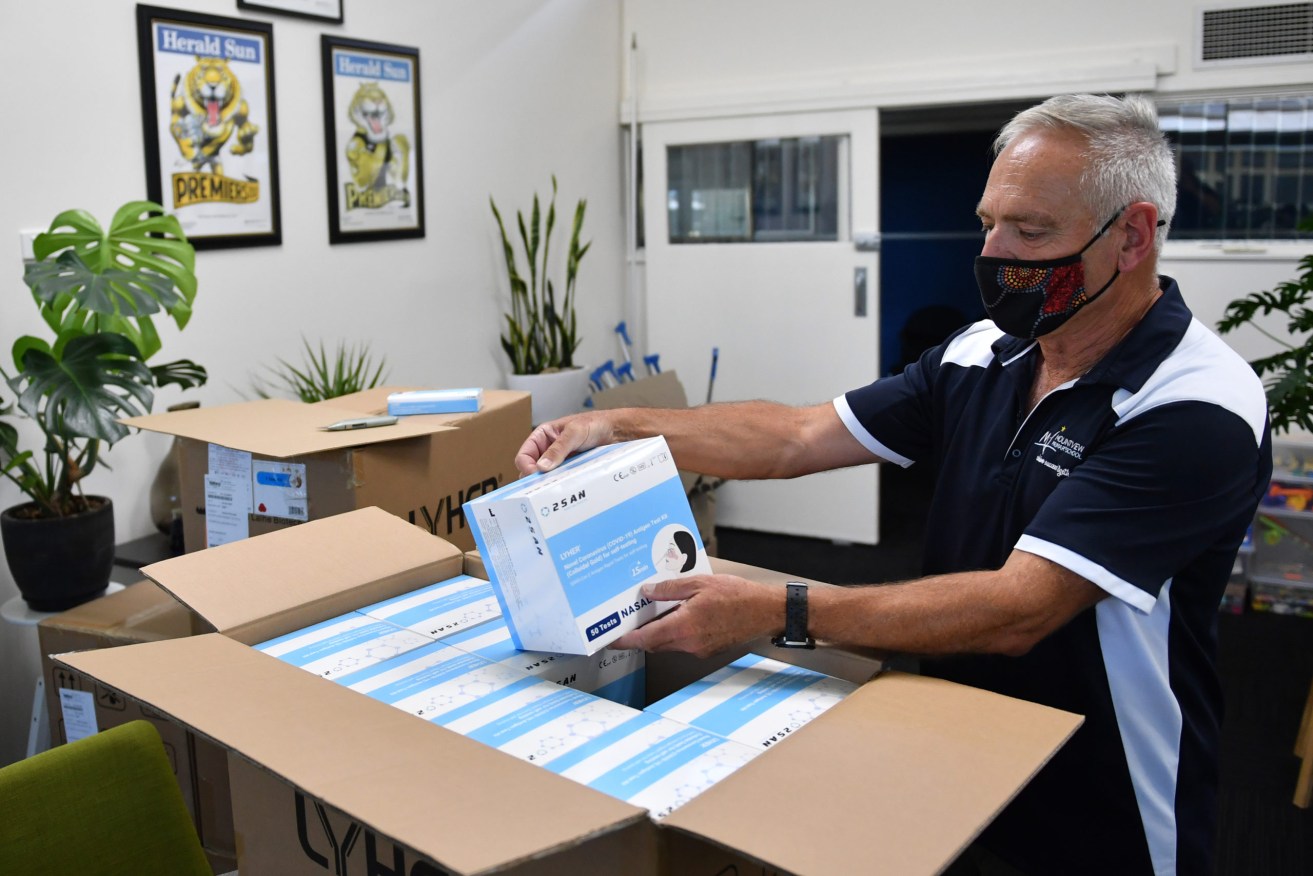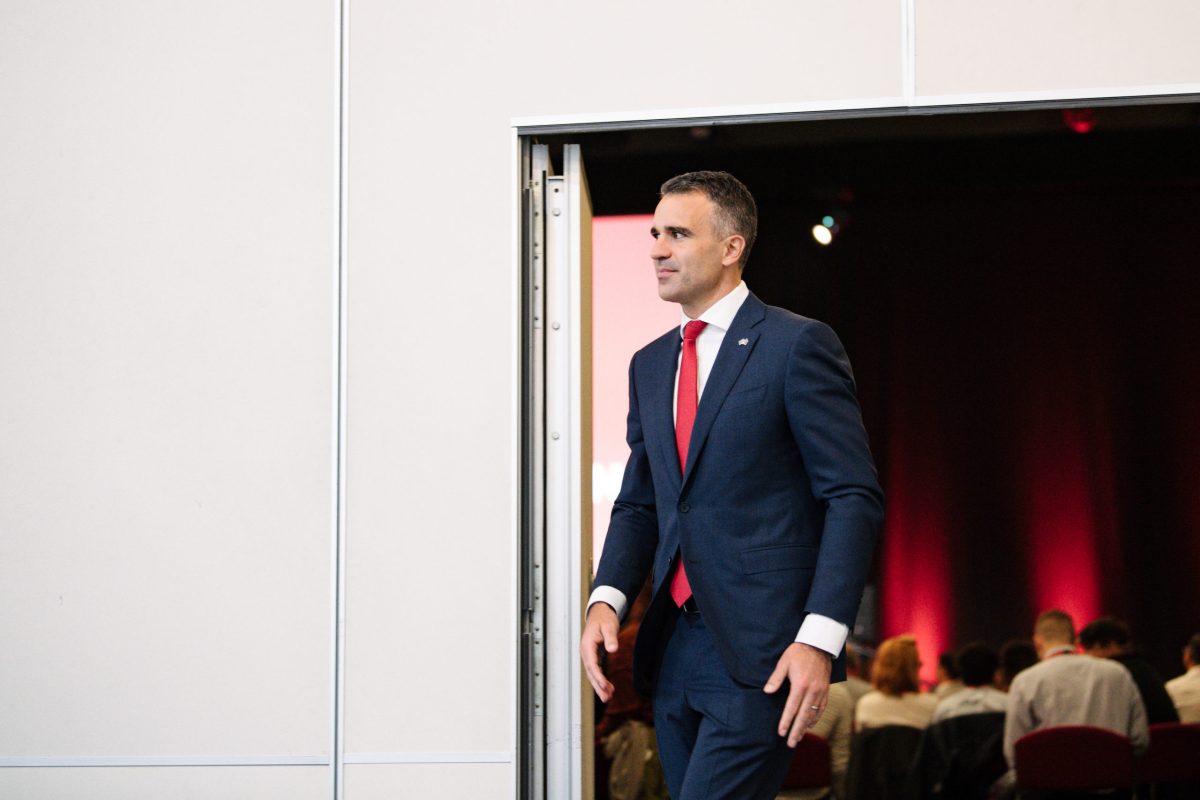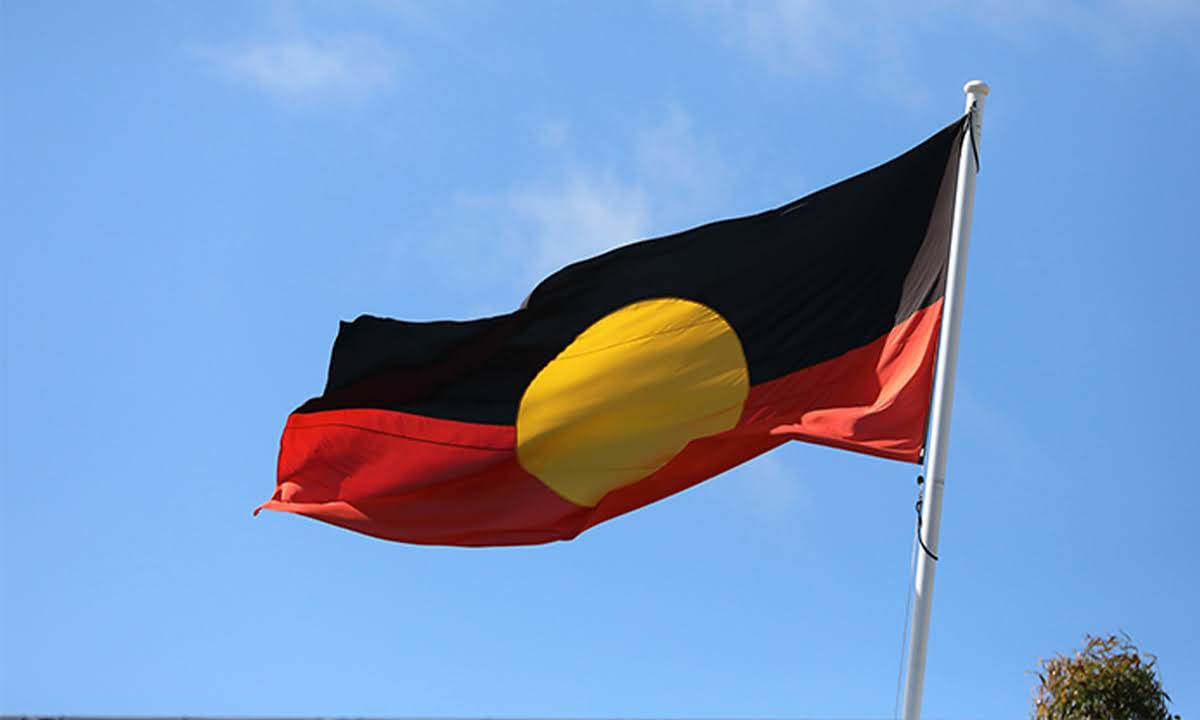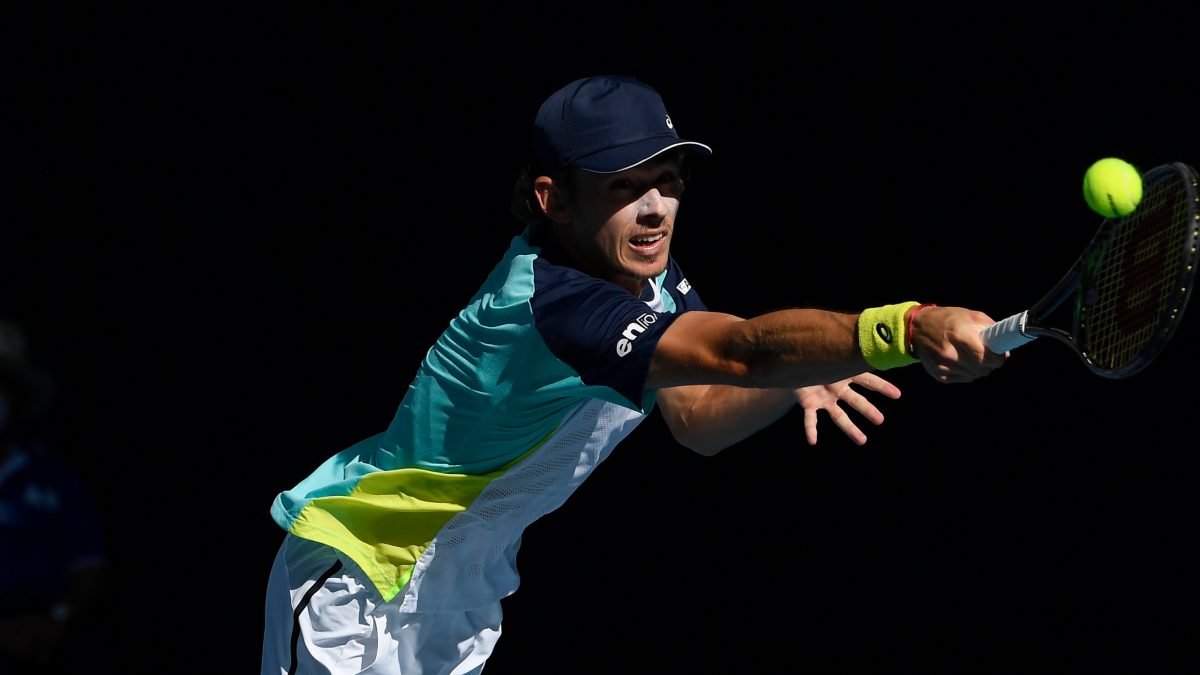What we know today, Tuesday January 25
Another 58 deaths have been recorded in Victoria and New South Wales as COVID-19 hospitalisations rise.

Melbourne school principal Glenn Butler with Rapid Antigen Tests as students prepare to return for face-to-face classes. Photo: AAP/Joel Carrett
- Another 58 deaths in NSW, Victoria as hospitalisations rise
- SA teachers vote to strike next Wednesday
- Labor pledges to ban political donations to SA parties
- Omicron cases peak as Australia hits two-year pandemic mark
- Australia claims Aboriginal flag rights
- UK scraps testing vaccinated passengers
- Alex de Minaur bows out of Australian Open
Another 58 deaths in NSW, Victoria as hospitalisations rise
Mask rules and hospitality density limits will remain in NSW after the state recorded a rise in COVID-19 cases, deaths and hospitalisations.
There were 18,512 new cases recorded on Monday, a jump of 3421, as well as 29 deaths, compared to 24 on Sunday.
NSW Health reports there are 2943 COVID patients in NSW hospitals, up by 127, and 183 people in ICU, 13 fewer than the previous day.
Two years after the virus was first recorded in Australia. Premier Dominic Perrottet reiterated the state’s hospitalisation rate remained lower than the so-called “best-case” model.
But mask rules and hospitality density limits reintroduced before Christmas to pump the brakes on Omicron’s spread will continue beyond January 27.
“The restrictions we put in place last year … will be rolling over for another month,” the premier told reporters on Tuesday.
More than 33 per cent of eligible people in NSW have had three doses of a COVID-19 vaccine.
Perrottet promised businesses reeling from the effects of the Omicron wave of COVID will get fresh support within a week.
The state Labor opposition says a business support package is urgently needed to lift small and medium-sized businesses out of the summer’s “shadow lockdown” as the rampant virus keeps workers and customers at home.
Meanwhile, Victoria recorded 14,836 new COVID-19 cases and 29 deaths, as the number of people in hospital fighting the virus jumps back into four figures.
Hospital patients with COVID-19 in Victoria have risen by 59 to 1057, after falling slightly in recent days.
There are 119 people in Victoria in intensive care, with 45 of those on a ventilator.
The latest figures come as schools across the state are receiving rapid antigen tests in the lead up to students and teachers returning to classrooms next week amid the Omicron wave.
SA teachers vote to strike next Wednesday
The SA teachers’ union will meet this morning to discuss whether to proceed with a statewide strike next Wednesday, after a ballot found almost two-thirds of teachers supported taking stop-work action to protest against the government’s back to school plans.
In a statement released late yesterday afternoon, the Australian Education Union said a ballot of all its preschool and school members found almost two-thirds supported taking industrial action in the form of a full day stoppage on the first day of Term 1.
The ballot was called last week in response to safety concerns about the government’s plan to return students to classrooms in the midst of a coronavirus outbreak.
The union said last week that a strike could be avoided if the government agreed to delay the start of Term 1 by two weeks to give schools time to make sure their sites were COVID-safe.
But Premier Steven Marshall ruled out postponing the start of the school year and instead announced a “staggered” return to classrooms, whereby for the first two weeks of Term 1, those in Reception and Years 1, 7, 8 and 12 would return for face-to-face learning, while those in all other year levels would stay at home and learn online.
Union officials will meet at 11am today to discuss the outcome of the ballot and to assess whether the government had adequately addressed their concerns since last Wednesday.
If they decide the government had made “sufficient progress” , a second ballot would be called to postpone the strike.
AEU state branch president Andrew Gohl told InDaily that over 7500 teachers voted in the ballot.
“I’ve been a member of the union since 1988 as a sub-branch secretary and I can’t ever recall such a significantly strong response,” he said.
“Overlay that with the fact it’s school holidays and we’re not organising sub-branch by sub-branch, site by site – we’re really just done this outside of that usual structure.
“It’s been a staggering response in that respect.”
The union issued 19 demands to the government, including the postponement of the start of Term 1 by two weeks, additional COVID-19 leave, free rapid antigen tests for teachers, random daily testing of students and air purifiers in every classroom.
“Unlike the health sector with the provision of full PPE that includes N95 masks and face shields, educators will return to classes of up to 29 students with measures that include at best N95 masks in some classroom situations, social distancing – albeit impossible for many – sanitiser and cleaning with the option to teach outside if weather permits and open windows if possible,” it said in a statement.
Education Minister John Gardner told reporters yesterday that the government and union officials held “constructive” discussions over the past week and he thought the ballot was called too early.
He said the union was offered the opportunity to meet with chief public health officer Professor Nicola Spurrier to discuss its concerns.
“We’ve been able to resolve a number of the issues that were raised last week by the AEU leadership,” he said.
“I think one of the most significant issues raised by the AEU was in relation to the use of rapid antigen tests for surveillance testing in schools and this government has, as we have throughout the pandemic, listened to Professor Spurrier and the health team in supporting our educational facilities.
“I think it would be a mistake to go against the strong and clear health advice in relation to this.”
When asked if the government had contingency plans in place if the strike went ahead, Gardner said: “I don’t think we’re at that stage yet”.
He said he was confident that all students would be able to return to face-to-face learning on February 14, following a staggered start to the school year.
“We’re very confident that as we pass the peak of Omicron transmission, we will be able to do our bit to suppress the spread by having that staggered start, but it is so important we have all our kids back on the 14th of February,” he said.
“So far, certainly the health advice has very strongly backed up that we will be able to do that.
“I don’t see that there’s any likely scenario that we won’t be back on the 14th of February.”
Labor pledges to ban political donations to SA parties

SA Labor Leader Peter Malinauskas. Photo: Morgan Sette/AAP
All political donations from individuals, businesses and unions should be banned, Opposition Leader Peter Malinauskas has declared, pledging to move towards abolishing the practice for state elections if he wins government in March.
In a speech delivered on Monday night to the Dunstan Foundation, the Labor leader said that if elected he would move towards the abolition of campaign donations and fundraising, long overseen for the ALP by SA Progressive Business, which would be disbanded.
It’s the first move of its sort in SA since former Liberal leader Isobel Redmond sought to crack down on big donations to political parties – a push that ultimately failed to materialise.
Malinauskas’s move would aim to go further – banning donations entirely – but he stopped short of guaranteeing that the reform could be achieved, instead noting that “implementing such a change would present complex legal and policy challenges”.
Instead, he pledged to commission the Attorney-General’s Department “to undertake a detailed analysis of the issues and provide policy advice”, with the Solicitor-General to “provide legal advice on potential legal challenges”.
He said a Labor Government would seek Liberal and minor party support “for such a significant, long-term reform”, which he insists would not see taxpayers slugged more for public campaign funding.
He suggested “one model would see political parties which receive public funding – as currently occurs – required to adhere to a ban on donations, similar to the existing campaign spending caps that apply”.
But he noted there would be complicated jurisdictional issues with state-based parties still entitled to receive funding for federal campaigns and “political party administration”.
He said there were also questions about “what this means for the ability of individuals to self-fund their own campaign [and] how changes to donation laws operate in relation to new or smaller parties and independents”.
“The people have every confidence in the basic concept of giving every person an equal say and letting the majority decide,” Malinauskas’s speech said.
“Where they lack confidence more and more every year is in the idea that the public institutions where we all serve really do give every person an equal say… quite frankly, I can’t blame them.”
– Tom Richardson
Read the full story here.
Omicron cases peak as Australia hits two-year pandemic mark
Two years to the day since Australia’s first confirmed COVID-19 case, authorities say Omicron outbreaks have peaked amid ongoing shortages of rapid antigen tests.
Today marks two years since Australia confirmed its first COVID-19 infection – on January 25, 2020 – in a Victorian man who flew from China to Melbourne.
The country recorded a cumulative 40,681 new infections and 58 additional deaths on Monday, with Federal Health Minister Greg Hunt declaring infections had peaked in New South Wales, Victoria, the ACT and potentially South Australia.
“It’s an important moment where we are seeing, now, clear signs that this Omicron wave, at least in New South Wales, Victoria, and the ACT, has peaked,” he said.
“South Australia has also had some very promising signs as the Premier and the chief health officer have indicated, along with the health minister there.”
SA recorded 2009 new COVID cases yesterday, which Premier Steven Marshall described as “the lowest we’ve seen for a very long period of time” – however that came from a low day of testing, with 9756 PCR tests conducted and 4005 RAT kits administered, a 20.8 per cent testing decrease on the previous day.
The number of people in hospital remained steady however, with 294 cases hospitalised, 29 of whom were in intensive care and six on ventilators.
Meanwhile, concession card holders have become eligible for 10 free rapid antigen tests from pharmacies over a three-month period.
But Pharmacy Guild of Australia president Trent Twomey said widespread supply shortages meant many pharmacies would be unable to keep up.
The federal government sought to pin the blame on people and companies hoarding tests.
“It (the concession card rollout) is a staged program; it commences this week with more pharmacies participating as supply comes in,” Hunt said.
“The advice we have is there are 16 million rapid antigen tests expected in the pharmacies over the remaining period between now and the end of July (sic January) – that’s just from what are called the wholesalers.”
A new rapid antigen test collection site will open at Para Hills West at 8am today, while another site is planned to open in Playford by the end of the week.
The Para Hills West site is located at The Paddocks near the corner of Kesters and Bridge Roads.
Another test collection site opened at the Noarlunga Interchange car park yesterday, bringing the total number of sites to four in metropolitan Adelaide and eight across regional South Australia.
“Omicron was a game changer but South Australia’s strong plan is mitigating the health and economic threat while also navigating our State’s inevitable opening up and protecting local jobs during this challenging period,” Premier Steven Marshall said.
Australia claims Aboriginal flag rights

Photo: InDaily
The Aboriginal flag now “belongs to everyone” after the federal government completed a $20 million deal to take ownership of its copyright.
Previously owned by the flag’s designer, Luritja artist and activist Harold Thomas and a non-Indigenous clothing company, the flag is now freely available for public use.
It comes after a number of Indigenous groups were sent cease and desist warnings for using the flag in an apparent breach of copyright.
Minister for Indigenous Australians Ken Wyatt said it was “profoundly important for all Australians”, adding “no one can take it away”.
“Over the last 50 years we made Harold Thomas’ artwork our own – we marched under the Aboriginal flag, stood behind it, and flew it high as a point of pride,” he said.
“In reaching this agreement to resolve the copyright issues, all Australians can freely display and use the flag to celebrate Indigenous culture.”
The federal government began negotiating with Thomas to take over the copywrite licence in 2019.
Carroll and Richardson Flagworld will remain the exclusive licensed manufacturer and provider of Aboriginal flags and bunting.
But Flagworld won’t restrict individuals from making their own flag for personal use.
As part of the deal, the commonwealth will put all future royalties received from Flagworld’s sale of the flag towards the work of NAIDOC.
Prime Minister Scott Morrison was thankful the flag had been put in public hands.
“The Aboriginal flag will now be managed in a similar manner to the Australian national flag, where its use is free, but must be presented in a respectful and dignified way,” he said.
“All Australians can now put the Aboriginal flag on apparel such as sports jerseys and shirts, it can be painted on sports grounds, included on websites, in paintings and other artworks, used digitally and in any other medium without having to ask for permission or pay a fee.”
UK scraps testing vaccinated passengers
Double-vaccinated travellers will no longer need to take a coronavirus test when arriving in the UK as the policy has “outlived its usefulness”, the British transport secretary has announced.
Grant Shapps said post-arrival lateral flow tests will no longer be required as restrictions were “firmly placed in the past”.
He told the UK parliament the move would help the aviation industry to “take back to the skies”.
Shapps told MPs that the definition of fully vaccinated as “two doses of an approved vaccination or one dose of a Janssen vaccine” would remain for now.
But he said the rules for those who do not count as fully vaccinated would change too.
He said: “We’ll go further, the measures for those arriving in the UK who do not qualify as fully vaccinated have not changed since last March, so the time has come to review that position too.
“Today, I can announce that passengers who do not qualify as fully vaccinated will no longer be required to do a day eight test after arrival, or indeed to self-isolate.
“They will still need to fill out a passenger locator form to demonstrate proof of a negative COVID test taken two days before they travel and they must still take a post-arrival PCR test.
“This is a proportionate system that moves us a step closer to normality while maintaining vital public health protections.”
He said the government intends to move away from “blanket border measures” to a “more sophisticated and targeted global surveillance system”.
Earlier, UK Prime Minister Boris Johnson said the rules could be lifted because the country was “moving through the Omicron wave”.
“So what we’re doing on travel, to show that this country is open for business, open for travellers, you will see changes so that people arriving no longer have to take tests if they have been vaccinated, if they have been double vaccinated,” he said.
The changes will come into effect from on February 11.
Alex de Minaur bows out of Australian Open

Photo: Alex de Minaur/AP
Local hope Alex de Minaur has made a familiar exit from the Australian Open, this time at the hands of emerging star Jannik Sinner.
De Minaur, who beat world No.7 Matteo Berrettini this month at the ATP Cup in Sydney, dropped just one set at Melbourne Park en route to the fourth round and again threatened to go deep into his home slam.
But the 7-6 (7-3) 6-3 6-4 defeat to Sinner on Monday night marked the sixth time de Minaur has exited a major tournament in the third or fourth round, including his last three appearances at Melbourne Park.
The 22-year-old’s sole grand slam quarter-final appearance to date came at the 2020 US Open.
“I had some good results and it was a little bit of a bittersweet ending,” de Minaur said.
“I didn’t want my Australian Open campaign to be done tonight, but it’s just how it went.
“I had my chances and didn’t take my opportunities, those break points early and I came up against an opponent that played very well.
“He played some very good tennis in the important moments.”
Meanwhile, Russian Daniil Medvedev will face Canadian Felix Auger-Aliassime in the quarter-finals after both banked four-set victories.
Frenchwoman Alize Cornet burst into tears of relief and joy after finally advancing to the last eight at a grand slam at her 63rd attempt with an epic win over Simona Halep.
-With AAP and Reuters




